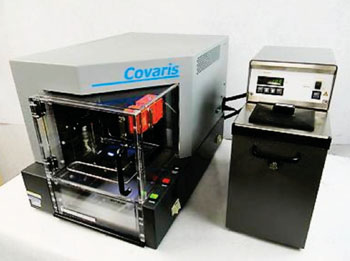Genetic Causes of Bowel Cancer Clarified
By LabMedica International staff writers
Posted on 14 Jul 2016
Colorectal cancer (CRC) displays a complex pattern of inheritance and it is postulated that much of the missing heritability of CRC is enshrined in high-impact rare alleles, which are mechanistically and clinically important.Posted on 14 Jul 2016
A landmark study has given the most detailed picture yet of the genetics of bowel cancer, the UK's fourth most common cancer, and the genetic architecture of CRC susceptibility encompasses a broad spectrum of risk, from rare, highly penetrant germline mutations associated with well-characterized syndromes to common polymorphisms, each individually conferring small risk.

Image: The E220 focused-ultrasonicator for DNA fragmentation (Photo courtesy of Covaris).
Scientists at the Institute of Cancer Research (London, UK) and their colleagues included in a study 1,028 unrelated patients (559 male) with CRC, aged ≤55 years at diagnosis (mean age 48.7 ± 6.0), who had at least one first-degree relative with CRC, ascertained between 2003 and 2011. All the patients were UK residents and had self-reported European ancestry. Germline DNA was isolated from EDTA-venous bloods using standard methods and picogreen quantified. The controls comprised 1,644 healthy individuals from the UK and an additional 670 individuals, all who were sequenced.
A Covaris E Series instrument (Covaris Inc., Woburn, MA, USA) was used to fragment 1 μg of DNA from each individual. Illumina’s Truseq 62 Mb expanded exome enrichment kit was used to prepare indexed paired-end libraries, 2 × 100 bp sequencing was performed using the HiSeq2000 technology (Illumina, San Diego, CA, USA). The scientists also performed read mapping and variant analysis, sample-level quality control, ExomeArray concordance and other methodologies.
The investigators found that added together, all the discovered variants in the known bowel cancer genes accounted for less than a third of familial cases of bowel cancer, those occurring in people whose close relatives had already developed it. The rest of the familial cases must therefore be caused largely by minor DNA variations that in combination add up to increase risk, with environmental factors also contributing. For an individual person, the risk of developing bowel cancer comes from a mix of inherited risk through their genes and environmental risk, which is caused by non-genetic factors such as lifestyle. Around 12% of cases occur in people with a family history of bowel cancer, with inherited mutations in known cancer-causing genes such as Adenomatous Polyposis Coli (APC) and MutL Homolog 1(MLH1) often playing a major role.
Richard S.Houlston, MD, PhD, a Professor of Molecular and Population Genetics and senior author of study, said, “Our study is the largest ever conducted of the genetics of bowel cancer, and sets out a detailed map of the disease that could lead us to new ways of treating or preventing it. Each cancer gene that has been discovered, or common genetic variant that we will continue to uncover, provides us with new insights into the underlying biology of the disease, and increases our ability to assess people for their risk.” The study was published on June 22, 2016, in the journal Nature Communications.
Related Links:
Institute of Cancer Research
Covaris
Illumina













